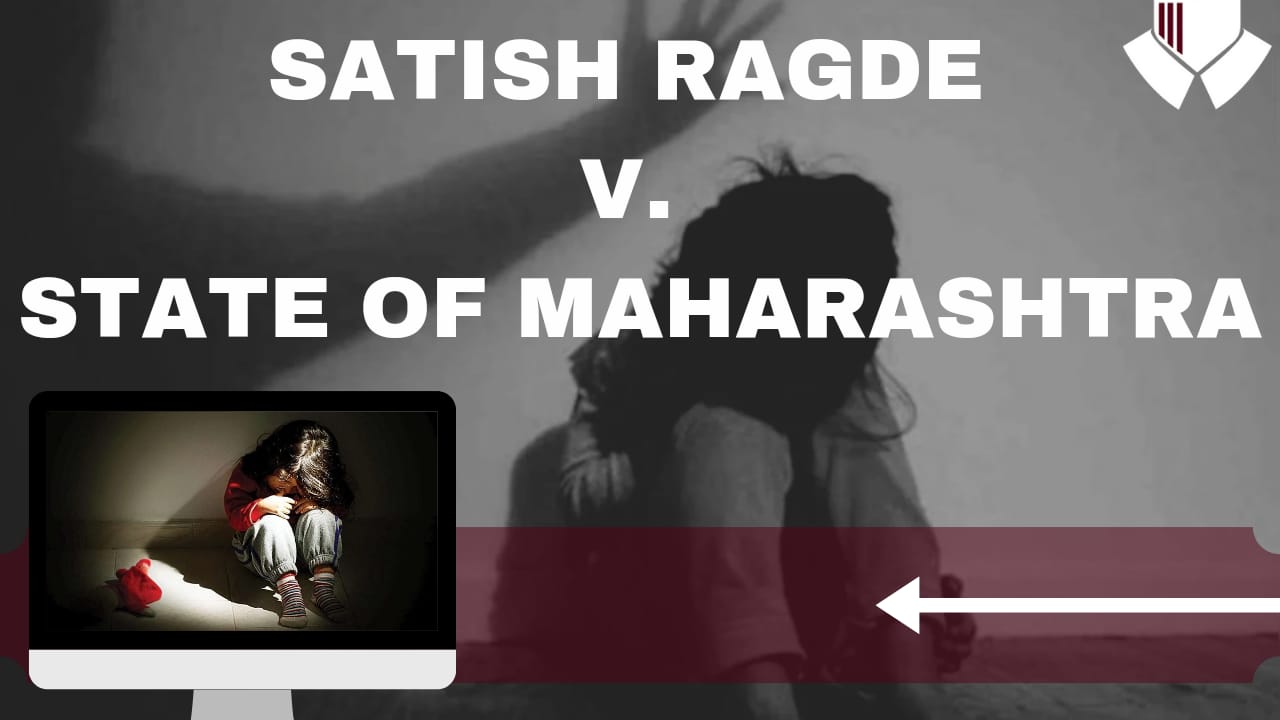This case analysis is done by Shivanshu Shivam a 1st year law student at Chanakya National Law University, Patna.
Date of the Case: January 19, 2021
Appellant: SATISH S/O BANDU RAGDE
Respondent: THE STATE OF MAHARASHTRA THROUGH POLICE STATION OFFICER
Bench: PUSHPA V. GANEDIWALA
Legal Provisions: Sections 354, 363, and 342 of the Indian Penal Code and Section 8 of the Protection of Children from Sexual Offences Act, 2012
Background
- On December 14, 2016, the prosecutrix (a 12-year-old girl) went to bring guava, but she didn’t return. A neighbour informed her mother that the appellant took her daughter to his house; thereafter, he visited the accused place and saw the appellant (or accused) coming down the stairs. When she searched for her, she found her daughter crying on the first floor of the accused room, where he locked her, and then she narrated the incident that the appellant pressed her breast and tried to remove her salwar, causing her to shout. Thereafter, the mother and her daughter filed a report against the appellant.
- Hearing the matter, the Extra Joint Additional Sessions Judge convicted the appellant of violating Sections 354, 363, and 342 of the Indian Penal Code and Section 8 of the Protection of Children from Sexual Offences Act, 2012, and sentenced him to rigorous imprisonment for 3 years with a fine of Rs. 500.
Issues
- Whether the “pressing of the breast” and “attempt to remove salwar” constitute “sexual assault” as that term is defined in Section 7 of the POCSO Act and penalised in Section 8 or not
- The reason behind the consideration is that in Section 7 of the POCSO Act, Sexual assault is defined as “Whoever, with sexual intent, touches the vagina, penis, anus, or breast of the child or makes the child touch the vagina, penis, anus, or breast of such person or any other person, or does any other Act with sexual intent that involves physical contact without penetration, is said to commit sexual assault.”
Appellant’s Arguments
The petitioner argued that the definition of sexual assault in Section 7 of the POCSO Act doesn’t apply in the present case and also claimed that the PW-1’s (mother of the girl) testimony would be admissible under Section 6 of the Evidence Act, but she is a hearsay witness. They also argued over the girl’s mental capacity, something the learned trial court noticed when it recorded the girl’s evidence. It is true that the witness may not possess such mental intelligence based on her demeanour.
Respondent’s Arguments
In order to establish the guilt against the appellant or accused, the prosecution examined all five witnesses and also brought on record the relevant documents, and they argued that as per the definition of ‘sexual assault’, ‘physical contact with sexual intent without penetration’ is an essential ingredient of the offence and on the premise of the principle of ‘ejusdem generis’, the appellant is guilty.
Judgment
- The court held that the accusation that the appellant stripped off her top and touched her breast is not one made by the prosecution. The penalty for the offence of “sexual assault” is both a fine and imprisonment of either kind for a duration that must not be less than three years but may go as high as five years. Since the punishment for the offence is so severe, stronger evidence and stronger claims are needed.
- The court held that in the absence of any precise information on whether the top was removed or whether he put his hand inside the top and touched her breast, pressing the breast of a kid under the age of 12 would not be considered “sexual assault.” It would undoubtedly qualify as a crime under Sections 342 and 354 of the Indian Penal Code after having regard to the circumstances of the alleged act.
- The appellant removed her top and pressed her breast, according to the court, but this is not the prosecution’s case, so it is not conceivable to accept the submission. As a result, the court determined that the appellant was guilty of a minor offence under Section 354 of the IPC and was acquitted under Section 8 of the POCSO Act. The court also sentenced him to one year of rigorous imprisonment and a fine of Rs. 500, or one month of rigorous imprisonment if the fine was not paid.
CONCLUSION
The court gave the judgment based on the interpretation of the word-to-word given in Section 7 of the POCSO Act and recognized that it is only a matter of outraging the modesty of a woman and wrongful confinement, but the court failed to look upon the basic idea behind the POCSO Act and also to understand the implication of their own judgment when they declared skin-to-skin contact will come under Section 7 of the POCSO Act.
The Supreme Court eventually overturned this decision of the Bombay High Court and stated that sexual intent, not skin-to-skin contact, is the primary element of sexual assault. Direct skin-to-skin contact is not required to qualify as sexual assault under Section 7 of the Criminal Code, according to the Supreme Court. According to the Supreme Court, sexual assault under the POCSO does not only require direct physical contact; it can also occur indirectly.
REFERENCES
- Sunaina Verma, Case Brief: Satish Ragde v. State of Maharashtra, LAW BHOOMI, (Sep. 17. 2022), https://lawbhoomi.com/satish-ragde-v-state-of-maharashtra/
- AISHWARYA SANDEEP, https://aishwaryasandeep.com/2022/03/14/case-analysis-satish-ragde-v-s-state-of-maharashtra/ (last visited May 30, 2023)
- INDIAN KANOON, https://indiankanoon.org/doc/158325618/, (last visited May 30,2023)


